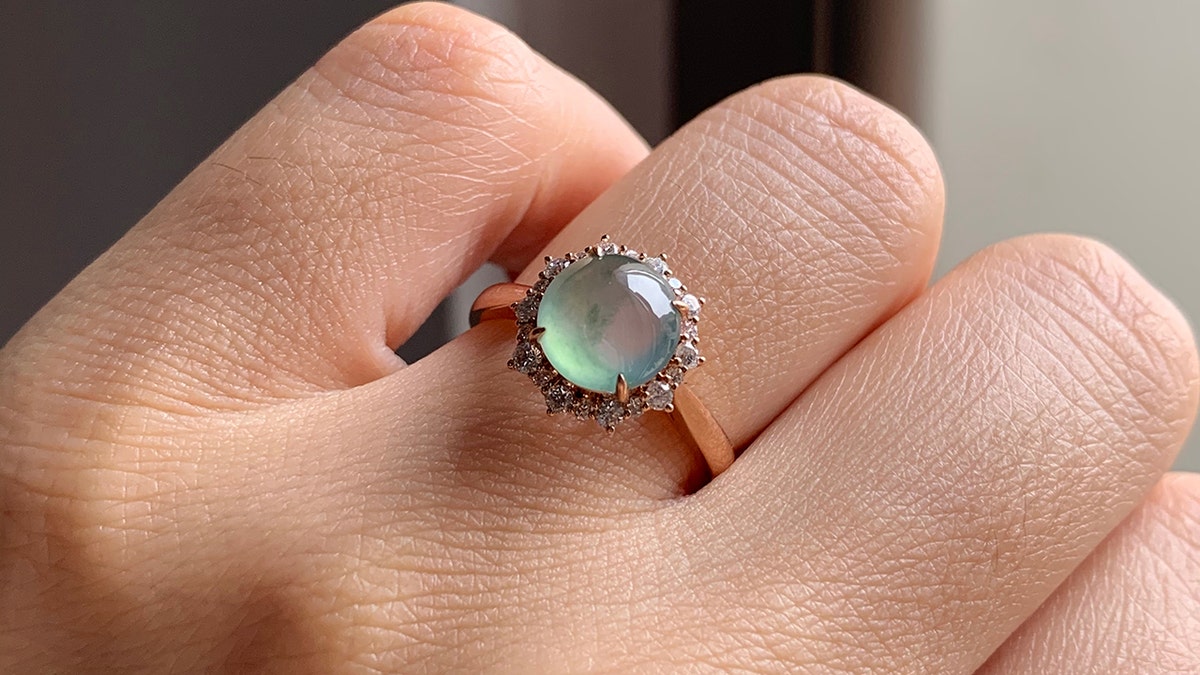Mood rings were one of the biggest fashion fads during the 1970s — touted as having the ability to “identify” the mood of the ring wearer by a corresponding color.
During that decade, as people were exploring self-expression and fashion statements, mood rings were super popular.
“Mood-changing jewelry first became popular in New York City and quickly spread throughout the United States,” notes Encyclopedia.com.
PERMANENT BRACELETS: THE TREND THAT’LL GIVE THE ‘THRILL’ OF A TATTOO ‘WITHOUT THE PAIN’
A mood ring contains a temperature-sensitive liquid crystal encased in quartz, the same source indicated.
As the ring wearer’s body temperature changes, the ring’s crystal also change colors.
Each color corresponds with a different mood, according to Encyclopedia.com.

As the ring wearer’s body temperature changes, the ring’s crystal also change colors. Each color supposedly corresponds with a different mood. (iStock)
Below are the colors that a mood ring reveals, as pointed out by sciencenotes.org.
(While there are a variety of styles, these colors are often matched to the mood below.)
- Amber or orange: unsettled or anxious
- Green: Alert, awake
- Blue: Calm, comfortable
- Violet or Purple: Passionate, excited and energetic
- Pink: Nervous
- Red: Agitated, anxious, angry
- Black: Usually, the “cold” color of a mood ring is black or brown; this is also the color of a broken mood ring
Since mood rings are sold as novelty items, it’s important to note that a jewelry company can put whatever it wants on the color chart that comes with the mood ring, according to ThoughtCo.
WIFE TO AUCTION OFF HUSBAND’S COLLECTION OF 400 VINTAGE IRONS: ‘BROUGHT HIM JOY’
Since there’s no universal distinction for which color corresponds with a particular mood, it’s a subjective decision by the manufacturer of the mood ring.
It’s likely the jewelry company “will just go with whatever chart looks pretty,” the same source noted.
‘Can never be 100% accurate’
Various types of mood jewelry are available, including necklaces and earrings.

Since there’s no universal distinction for which color corresponds with a particular mood, it’s a subjective decision by the manufacturer of the mood ring. It’s likely the jewelry company “will just go with whatever chart looks pretty.” (iStock)
Since these ornaments aren’t always touching the skin, they may change color in response to temperature but can’t reliably indicate the wearer’s mood, according to ThoughtCo.
VINTAGE PYREX BOWLS MAY BE WORTH BIG BUCKS AS COLLECTORS HUNT HIGH AND LOW FOR NOSTALGIC DISHES
Tara Emrani, a psychologist at NYU Langone Health, said she believes mood rings shouldn’t be taken too seriously.
“Because they don’t account for all psychological factors, they can never be 100% accurate and they are ‘never going to tell you something about your emotions that you don’t already know,’” Emrani told Refinery 29.
History of mood rings
Mood rings reportedly were invented in 1975 by two New York inventors, Josh Reynolds and Maris Ambats.
However, Marvin Wernick claimed to have developed the mood rings a decade earlier than that, noted The College of Staten Island.

Almost 50 years since the items were invented, mood rings, as well as other emotion-related accessories, have found a following again. (iStock)
Although the controversy exists, mood rings are still in high demand and a part of pop culture, the same source noted.
How are mood rings designed to work?
A person’s normal body temperature is 98.6°F; mood is correlated with body temperature, according to multiple sources.
“When you are stressed, cold blood is directed to the internal organs and away from the skin and the mood ring will turn a darker color,” according to The College of Staten Island.
CLICK HERE TO SIGN UP FOR OUR LIFESTYLE NEWSLETTER
“Therefore, there is a correlation with your mood and body temperature, so to some degree a mood ring can show your emotion.”
Mood rings are in demand
Almost 50 years since the items were invented, mood rings, as well as other emotion-related accessories, have found a following again.
The jewelry is brimming with nostalgia and the current cultural movement of being more open about feelings, according to The Financial Times.
To preserve a mood ring, steer clear of harsh chemicals and water.
Both of these can damage it, several sources said.
For more Lifestyle articles, visit www.foxnews.com/lifestyle.

